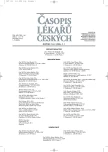Genetic Determinants of Osteoporosis
Genetická determinace osteoporózy
Osteoporóza je chronické progresivní onemocnění, při kterém kostní resorpce převažuje nad kostní tvorbou, což vede ke snížení kostní hmoty, k poruše kostní mikroarchitektury a následně ke snížení pevnosti kosti a vyššímu riziku zlomenin. Postihuje především ženy po menopauze, ale ohroženi jsou i starší muži. Ačkoli je osteoporóza ovlivněna řadou vnějších faktorů (hlavně dietou a fyzickou aktivitou), analýzy výsledků studií s různým designem (populační, rodinné, i asociační studie) ukázaly, že riziko vzniku osteoporózy a osteoporotických fraktur je významně podmíněno i geneticky. Vztah mezi genetikou a osteoporózou však dosud není detailně objasněn. Z dosud publikovaných výsledků je ale jasné, že i když existují vzácné mutace některých genů způsobující osteoporózu, osteoporóza je předevš ím otázkou polygenní, tzn., že je ovlivněna běžnými variantami (polymorfizmy) několika různých genů. Mezi geny sledované ve spojitosti s osteoporózou patří například geny pro receptor vitaminu D, estrogen receptor α, kolagen typu I α1, transformační růstový faktor β-1 a celá řada dalších. Tato práce shrnuje přehlednou formou současné znalosti o genetické determinaci osteoporózy.
Klíčová slova:
dědičnost, polymorfizmus, mutace, osteoporóza.
Authors:
J. A. Hubáček; M. Weichetová 1
Authors‘ workplace:
Institut klinické a experimentální medicíny, Praha
; III. interní klinika 1. LF UK a VFN, Praha
1
Published in:
Čas. Lék. čes. 2005; 144: 5-9
Category:
Review Article
Overview
Osteoporosis is a chronic progressive disease, characterized by higher bone resorption than bone mass accumulation. This leads to reduction of the bone mass, to microarchitectural deterioration of the bone tissue and to the increased risk of bone fracture. Osteoporosis affects predominately postmenopausal females, but it is also diagnosed at elderly males. Although osteoporosis is influenced by various environmental factors (mainly by dietary habits and physical activity), analysis of results obtained from studies with different designs (population-, family-, association - studies) confirmed, that risk of osteoporosis development and risk of osteoporotic fractures are significantly influenced by genetic predispositions. The genetic determination of osteoporosis is not yet completely understood. However, it is clear, that although there are mutations in some genes causing rare form of osteoporosis, osteoporosis is a polygenic disease - it is influenced by common variants (polymorphisms) of several different genes. For example genes for vitamin D receptor, estrogen receptor α, collagen type I α1, transforming growth factor ß-1 and some others are indicated to play a role in genetic determination of osteoporosis. In this review we summarize our recent knowledge about the genetic determination of osteoporosis.
Key words:
inheritance, polymorphisms, mutation, osteoporosis.
Labels
Addictology Allergology and clinical immunology Angiology Audiology Clinical biochemistry Dermatology & STDs Paediatric gastroenterology Paediatric surgery Paediatric cardiology Paediatric neurology Paediatric ENT Paediatric psychiatry Paediatric rheumatology Diabetology Pharmacy Vascular surgery Pain management Dental HygienistArticle was published in
Journal of Czech Physicians

- Advances in the Treatment of Myasthenia Gravis on the Horizon
- Possibilities of Using Metamizole in the Treatment of Acute Primary Headaches
- Metamizole at a Glance and in Practice – Effective Non-Opioid Analgesic for All Ages
- Metamizole vs. Tramadol in Postoperative Analgesia
- Spasmolytic Effect of Metamizole
-
All articles in this issue
- Genetic Determinants of Osteoporosis
- DNA Microarrays – A Modern Method for Differential Gene Expression Analysis and its Significance for Cancer Diagnostics and Therapy
- The Use of Moderate Hypothermia in Neurosurgery
- C-reactive Protein in the Pathogenesis o Atherosclerosis: Advantage and Pitfalls of the „Mainz Hypothesis“
- Ten Years of Molecular Monitoring of Chronic Myeloid Leukemia by Quantitative RT-PCR
- Mechanical Cardiac Support – The First Use in Czech Republic
- Pilot Study of the Noninvasive Assessment of Endothelial Dysfunction by Post-occlusion Dopplerometry Velocity Curves Analysis in Arteria Brachialis
- Acute Oesophageal Necrosis
- Physical Exercise and Yoga in Prevention and Treatment of Addictive Diseases
- A Glance into History of Angiology in Central Europe
- Journal of Czech Physicians
- Journal archive
- Current issue
- About the journal
Most read in this issue
- Acute Oesophageal Necrosis
- Genetic Determinants of Osteoporosis
- DNA Microarrays – A Modern Method for Differential Gene Expression Analysis and its Significance for Cancer Diagnostics and Therapy
- C-reactive Protein in the Pathogenesis o Atherosclerosis: Advantage and Pitfalls of the „Mainz Hypothesis“
